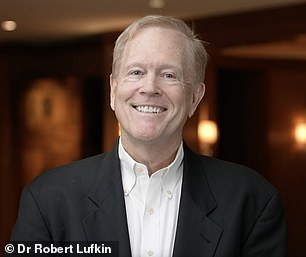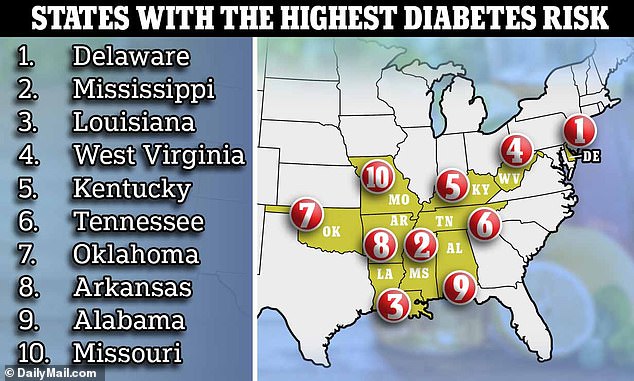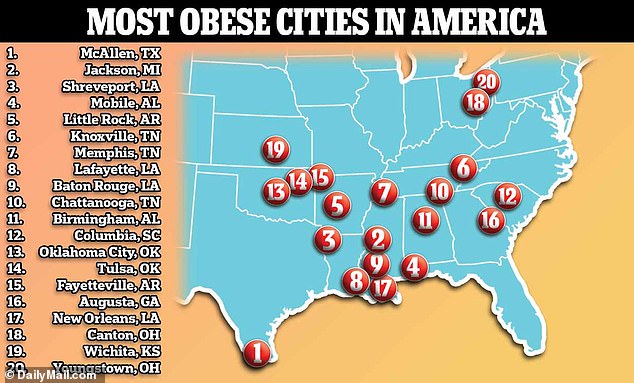A California doctor has revealed the biggest “lies” he claims doctors tell their patients, which could leave them vulnerable to serious chronic illnesses.
Dr. Robert Lufkin, a physician and professor at the University of California – Los Angeles and the University of Southern California, has been diagnosed with four chronic diseases throughout his life.
These include gout, high blood pressure, prediabetes and dyslipidemia, which causes an abnormal level of fats in the blood.
In his book ‘Lies I Taught in Medical School,’ Dr. Lufkin explains that his own health journey ‘awakened him’ to flaws in the medical system, including doctors treating symptoms instead of looking for an underlying cause.
And he pointed out “lies” – including some he used to learn himself – about several chronic diseases, including obesity and diabetes, that affect millions of Americans.
Researchers found that McAllen, Texas, was the most obese city in the United States.
Dr. Lufkin writes that he has tried every fad diet and has been a heavy consumer of processed foods, a vegan, a carnivore, and a follower of a low-fat and/or low-carbohydrate diet.
Now, however, eat as few processed foods as possible and limit carbohydrates, sugars, processed fats, oils and grains.
Despite the success he has personally had in making lifestyle changes, he warns that the “lies” and alternatives he proposes “are all mere hypotheses: imperfect models that attempt to explain the clinical experience of improved health.”
But they come from dozens of studies and scientific literature from experts.
Dr. Lufkin wrote in the first chapter of his book: ‘I was 100 percent a medical establishment person. I was totally in favor of organized systems, and my experience shows it. I was an unofficial spokesperson for the establishment.
‘I then developed four diseases that I had been taught (and others had been taught) that were related to aging and possibly a genetic component.
‘I did everything right and I was going to die. That shock set off alarm bells in my head. Something was deeply wrong in the medical system. I had been fed lies and I needed to know the truth.
Dr. Lufkin, who focuses on longevity and awareness, noted that “we are in a medical crisis much worse than COVID-19, and most people are not even aware of it” due to rising rates of chronic diseases.
Between 2000 and 2010, the percentage of middle-aged adults with two or more chronic diseases jumped from 16 percent to 21 percent. Just four years later, that percentage had increased to 32 percent.
By 2024, that rate will increase to 40 percent, Dr. Lufkin said.

Dr. Robert Lufkin is a longevity and consciousness physician in California.
The first lie Dr. Lufkin details is about obesity, which affects an all-time high of 42 percent of Americans.
“We now find ourselves in the worst global obesity epidemic the world has ever known,” he wrote.
‘Our understanding of the causes of this epidemic and approaches to treating it is based on a simple lie: that “a calorie is a calorie,” implying that obesity is caused by eating too many calories.’
Dr. Lufkin pointed out that this claim is false because obesity is not caused solely by consuming too many calories, saying that there are not “enough” to create obesity and that different types of calories have different effects on obesity.
Sometimes calories are converted to fat and stored in the body, while other times the body burns them directly.
The doctor wrote: “The key factor in controlling weight gain is how many calories we consume are stored compared to those that are burned. That number does not depend on the total number of calories, but on a biochemical signal in our body.”
That signal is the hormone insulin, which “tells cells to store calories primarily as fat. If calories are not stored as fat, they will be burned. There will be no weight gain,” he added.
“If insulin is activated and fat storage occurs, fewer calories will be burned,” leading to weight gain.
However, without the insulin signal, calories will be burned, preventing weight gain. Therefore, a person with insulin resistance, such as a person with type 2 diabetes, would have excessive insulin levels and an increased risk of weight gain.

Certain foods such as carbohydrates also cause increased insulin production, regardless of calories.
‘Not all calories have the same effect on weight gain. Therefore, losing weight is not just about fewer calories… Obesity is not just a caloric problem; it is an insulin problem,’ Dr. Lufkin wrote.
The calorie ‘lie,’ he explained, began in the 1970s, when there was a rise in obesity and the first set of Dietary Guidelines for Americans was published.
The guidelines recommended increasing carbohydrate intake and reducing fat intake.
The misconception grew in the 1990s, when the food pyramid was published, which emphasized high consumption of carbohydrates, which strongly stimulate insulin, leading many Americans to change their diet to a high-carb, low-carb diet. fats.
Dr Lufkin wrote: ‘By replacing fat calories with carbohydrate calories, we increase insulin and send the message to store fat. And store fat we did.
“Around the same time we replaced fat with carbohydrates in our diet, the obesity rate skyrocketed and hasn’t slowed since.”
Insulin (and carbohydrates) not only play a role in obesity, they are also at the center of diabetes.
One in three Americans is diabetic or prediabetic, and the CDC estimates that 80 percent of them don’t know they have the condition.
According to the CDC, 10 percent of American adults had diabetes between 2001 and 2004.
That figure rose to 13.2 percent between 2017 and 2020. It fell slightly to about 12 percent in 2021, the latest data available.
Dr. Lufkin called the overall upward trend in cases “the worst diabetes epidemic the world has ever known.”
“The diabetes lie declares that the best way to treat type 2 diabetes is with insulin.”
Type 2 diabetes accounts for 90 percent of diabetes cases. It is mainly caused by genetics and lifestyle, including diet (such as one high in carbohydrates) and weight.
As Dr. Lufkin discussed in his section on obesity, he writes that carbohydrates stimulate insulin. When hormone levels rise too high, insulin resistance occurs.
This makes the cells less sensitive to a dose of insulin that type 2 diabetics administer in an attempt to control their disease.
administer insulin “will increase the body’s overall insulin levels, worsening insulin resistance, the underlying cause of type 2 diabetes,” the doctor wrote.
Dr. Lufkin argued that dietary changes, such as eliminating refined carbohydrates such as white bread, and exercise could be more effective than insulin itself in lowering A1C, or average blood sugar levels, over a period of time. period of two to three months.
He said: ‘Sadly, our healthcare system is much more optimized to prescribe insulin and other medications to control type 2 diabetes than to give instructions on how to reverse it by changing our nutrition to avoid the causes.
‘To be fair, many people prefer to take a pill or injection rather than change their lifestyle. But most people don’t know how powerful and effective lifestyle choices can be.”


